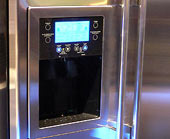| Samsung Electronics, is now developing a futuristic refrigerator equipped with radio frequency identification (RFID) technology. Samsung on Wednesday said the refrigerators will inform owners when supplies of products are running low. "We are working on refrigerators wired for RFID. Technologically speaking, there is no barrier to come up with the new items," Samsung spokesman Chae Hee-kook said. "The refrigerator will be able to connect to cell phones for various new-concept applications," Chae said. The RFID refrigerator will automatically sense inventory needs such as when milk or juices run low and will then notify its owner. In addition to the early-warning inventory system, the sophisticated home appliance will offer recipes using available food products. Via cell phones, shoppers will be able to check what groceries in their refrigerators are over their expiry date and what needs to be replenished. "Eventually the RFID refrigerator, when programmed, will be able to take charge of replenishment and re-order after checking for depleted groceries," Chae said. "Shoppers will go to the store to see new grocery orders already packed on their arrival. Or, the items will be delivered to their homes thanks to the smart appliance," Chae said. Despite its prospects, it is uncertain when Samsung will unveil the refrigerator since the appliance will be of use only when perishable items adopt RFID tags. "Some foretell 2008 or 2009 as the debut year of our RFID fridges. But we can’t say for sure because nobody knows when RFID tags will become widespread," Chae said. The RFID tag is a small integrated-circuit chip with a radio and identification code embedded into it, which can be scanned from a distance. The tiny tags that emit radio waves are likely to replace barcodes. More precisely, they would go far beyond barcodes thanks to its unique ability to contain information. A host of retailers are presently testing smart shelves incorporated with RFID technologies that track in-store inventory based on real-time purchases. This allows them to anticipate demand and replenish stock earlier than ever. The techniques also enable distributors to trace products in real time irrespective of their locations. In the future, the cutting-edge technology may be used in the fields of livestock tracking, highway toll collection and premium product manufacturing. |





